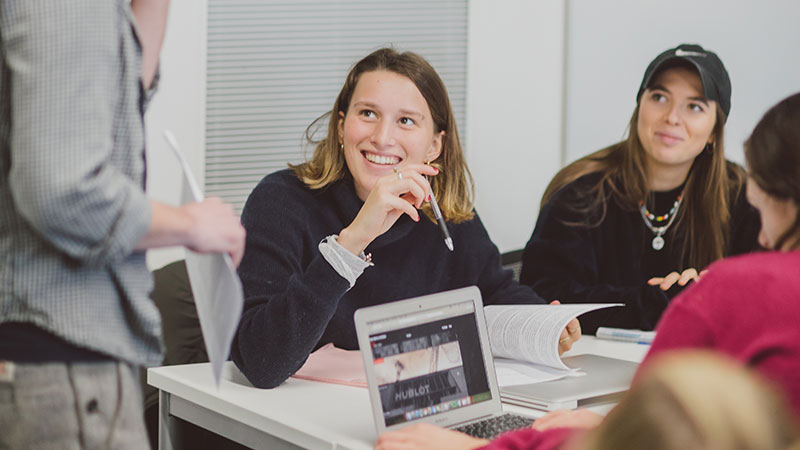Early Childhood Studies (final year entry)
BA (Hons)
Key facts
Overview
In a world where children’s futures are uncertain, qualified early childhood graduates with specialist practitioner skills and professional knowledge are needed more than ever.
On this final year course, you’ll enhance the learning you’ve already completed. You'll gain a solid understanding of the theory underpinning your practice. You’ll learn and master different pedagogical approaches - and you’ll know when, why and how to use them.
You'll have the support and guidance to develop your professional knowledge. You can also take the opportunity to make your own area of interest an important issue in Early Years through your dissertation. You’ll graduate ready to take a professional and leading role within the early years sector.

How to apply
Entry requirements
Specific entry requirements
Students will usually have achieved a Higher National Diploma in Early Childhood Education and Care or an equivalent relevant Early Years related level 5 qualification of 240 credits subject to individual credit rating by Oxford Brookes University.
Please also see the University's general entry requirements.
Terms and conditions of enrolment
When you accept our offer, you agree to the Terms and Conditions of Enrolment. You should therefore read those conditions before accepting the offer.
Credit transfer
Many of our courses consider applications for entry part-way through the course for students who have credit from previous learning or relevant professional experience.
Find out more about transferring to Brookes. If you'd like to talk through your options, please contact our Admissions team.
Application process
Full time Home (UK) applicants
Apply through UCASInternational applicants
Apply direct to the UniversityFull time international applicants can also apply through UCAS
Tuition fees
Questions about fees?
Contact Student Finance on:
Tuition fees
Please note, tuition fees for Home students may increase in subsequent years both for new and continuing students in line with an inflationary amount determined by government. Oxford Brookes University intends to maintain its fees for new and returning Home students at the maximum permitted level.
For further information please see our tuition fees FAQs.
Tuition fees for International students may increase in subsequent years both for new and continuing students.
The following factors will be taken into account by the University when it is setting the annual fees: inflationary measures such as the retail price indices, projected increases in University costs, changes in the level of funding received from Government sources, admissions statistics and access considerations including the availability of student support.
How and when to pay
Tuition fee instalments for the semester are due by the Monday of week 1 of each semester. Students are not liable for full fees for that semester if they leave before week 4. If the leaving date is after week 4, full fees for the semester are payable.
- For information on payment methods please see our Make a Payment page.
- For information about refunds please visit our Refund policy page
Additional costs
Please be aware that some courses will involve some additional costs that are not covered by your fees. Specific additional costs for this course are detailed below.
Optional costs
| Additional costs | Amount (£) |
|---|---|
It’s your responsibility to cover print / binding costs where coursework submission is required. Please note that a lot of the coursework is now submitted online. |
From £30 |
| You may choose to purchase books to support your studies. Many books on our reading lists are available via the Library, or can be purchased secondhand. | £20-60 per book |
Accommodation fees in Brookes Letting (most do not include bills) |
£94-265 per week |
Accommodation fees in university halls (bills included, excluding laundry costs) |
£135-200 per week |
Graduation costs include tickets, gowning and photography. Gowns are not compulsory but typically students do hire robes, starting at £41. |
Typically £0-200 |
Students are responsible for their own travel to and from university for classes. For the 2025/26 academic year, the University is introducing an alternative subsidised travel offer for all students with further information on our Travel webpages. |
From £10 |
Funding your studies
Financial support and scholarships
Featured funding opportunities available for this course.
All financial support and scholarships
Learning and assessment
On the course, you’ll be able to focus on your interests, and grow in the areas you care about most. You might explore how inequality impacts childhood. You might compare education systems across the world. You might examine child development. Or you might analyse children’s literacy - and how to build a love of reading.
You’ll emerge with a solid understanding of both teaching pedagogy, and practitioner techniques. This means you’ll fully understand how different approaches work, and you’ll know when, where and how to use them. You’ll ultimately be better equipped to support any child, in any situation.

Study modules
Teaching for this course takes place face to face and you can expect around 4 hours of contact time per week. In addition to this, you should also anticipate a workload of 1,200 hours per year. Teaching usually takes place Monday to Friday, between 9.00am and 6.00pm.
Contact hours involve activities such as lectures, seminars, practicals, assessments, and academic advising sessions. These hours differ by year of study and typically increase significantly during placements or other types of work-based learning.
Please note: As our courses are reviewed regularly as part of our quality assurance framework, the modules you can choose from may vary from those shown here. The structure of the course may also mean some modules are not available to you.
Learning and teaching
You’ll learn at our Headington campus, home of our School of Education, where you’ll have access to specialist education teaching spaces. You will gain specialist skills and knowledge. You might explore how inequality impacts childhood. Or look at education systems across the world.
You’ll be supported through your study by leading researchers in education, and the latest research and developments in education will directly inform your learning.
You will join a vibrant learning community, becoming part of a wider group of learners and educational professionals. You’ll learn through engaging seminars, online resources, and discussion-based workshops. You’ll also take part in collaborative activities, being part of an interactive approach to learning and teaching.
After you graduate
Career prospects
You’ll graduate as a confident and self-aware educational practitioner who can decisively employ the right techniques in your day-to-day practice.
You’ll be equipped to enter a range of careers - like:
- teacher training
- play therapy
- special educational needs
- educational psychology
- social work.
Related courses
Programme changes:
On rare occasions we may need to make changes to our course programmes after they have been
published on the website. For more information, please visit our
changes to programmes page.
